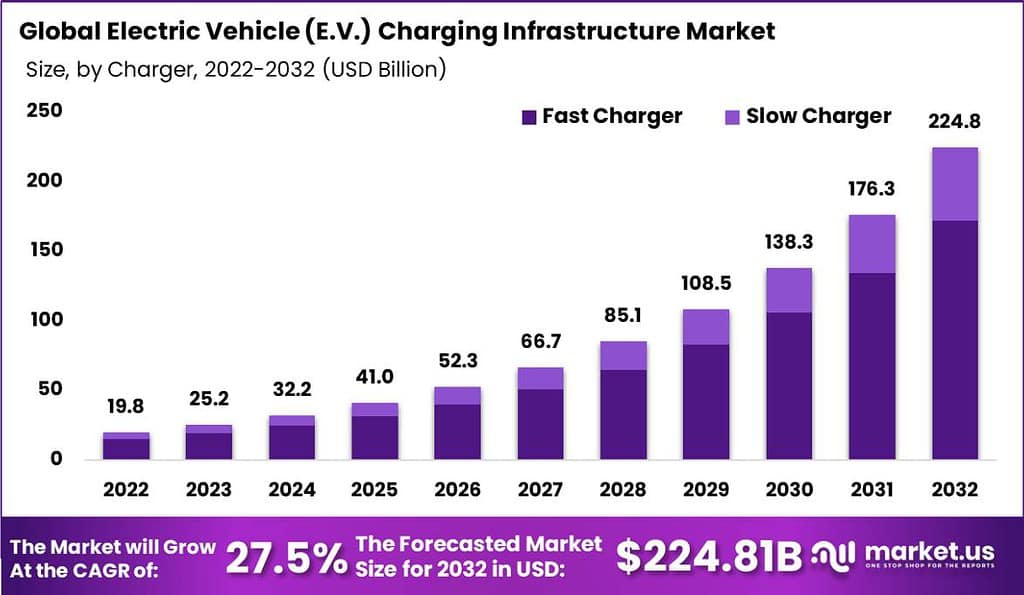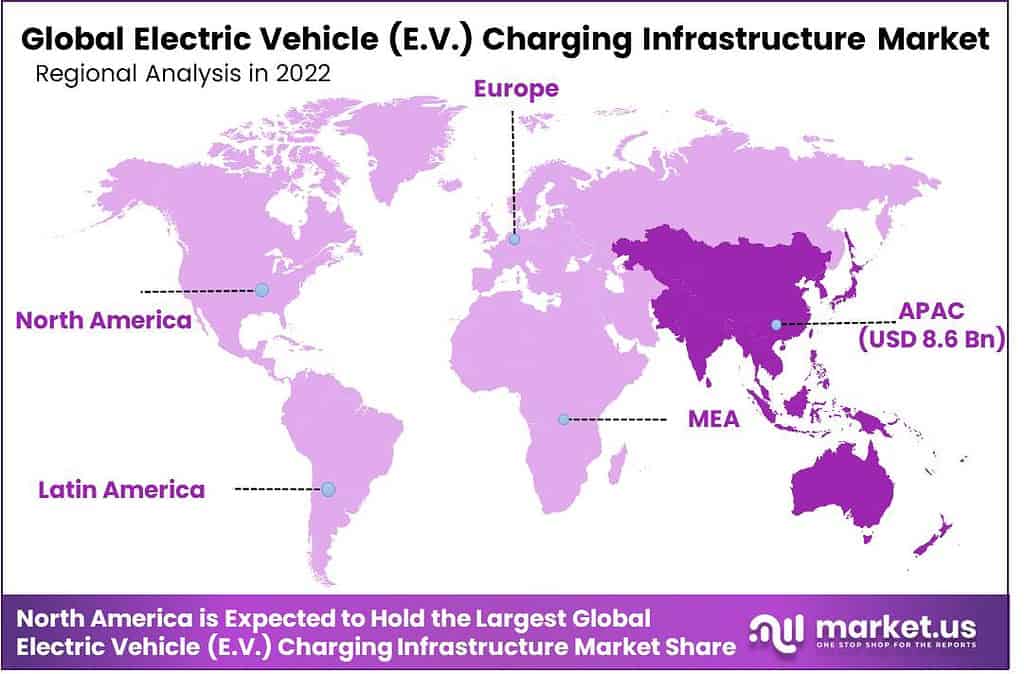New York, Feb. 07, 2024 (GLOBE NEWSWIRE) -- According to Market.us, The Electric Vehicle (EV) Charging Infrastructure Market is expected to expand at a 27.5% CAGR during the forecast period. The electric vehicle (ev) charging infrastructure industry is anticipated to be worth USD 25.2 Billion in 2023 and exceed USD 224.8 Billion by 2032.
The development of an extensive and robust electric vehicle (EV) charging infrastructure is crucial for the widespread adoption of electric vehicles and the transition to a sustainable transportation system. EV charging infrastructure refers to the network of charging stations and associated technologies that enable EV owners to recharge their vehicles conveniently and efficiently. This infrastructure plays a vital role in addressing the range anxiety concerns of EV users and promoting the overall growth and acceptance of electric vehicles.
The Electric Vehicle (EV) Charging Infrastructure Market is experiencing significant growth driven by the increasing adoption of electric vehicles (EVs) worldwide. This market encompasses the development, deployment, and management of charging stations and related infrastructure to meet the growing demand for EV charging. Moreover, collaborations between automotive manufacturers, utilities, and technology providers are facilitating the expansion of charging networks and the deployment of innovative charging solutions. With the increasing focus on sustainability and the transition towards cleaner transportation, the EV charging infrastructure market presents lucrative opportunities for stakeholders across the value chain.
Are you a start-up willing to make it big in the business? Grab an exclusive sample of this report here

However, challenges such as interoperability standards, grid integration, and infrastructure scalability remain pertinent, necessitating collaborative efforts to address barriers and accelerate the deployment of comprehensive charging infrastructure networks. In essence, the Electric Vehicle (EV) Charging Infrastructure market represents a pivotal component of the electrification ecosystem, poised for sustained growth as the global transition towards electric mobility gains momentum.
Important Revelation:
- Electric Vehicle (EV) Charging Infrastructure Market is projected to expand to USD 224.8 Billion by 2032, with a remarkable CAGR of 27.5% between 2023 and 2032.
- Fast chargers dominate the market with a major revenue share of 70.8%.
- DC charging leads the segment with a major revenue share of 58.6%.
- CCS holds the market lead with a major revenue share of 39.8%.
- Level 2 chargers dominate the market with a major revenue share of 51.6%.
- Commercial applications lead the segment with a major revenue share of 63.4%.
- Asia Pacific dominates the market with a major revenue share of 43.7%, driven by substantial investments in EV adoption and infrastructure development.
- Prominent players include AeroVironment Inc., ABB, Tesla Inc., Schneider Electric, and Siemens, among others, actively engaging in strategic partnerships and product developments to expand their market shares.
Buy Now this Premium Report to Grow your Business: https://market.us/purchase-report/?report_id=55977
Factors Affecting the Growth of the Electric Vehicle (EV) Charging Infrastructure Market
- Government Policies and Incentives: Supportive policies, subsidies, and incentives from governments worldwide play a pivotal role in driving the growth of the EV charging infrastructure market. These measures encourage investment in charging infrastructure deployment and promote EV adoption among consumers and fleet operators.
- Technological Advancements: Innovations in EV charging technology, including faster charging speeds, wireless charging, and smart charging solutions, drive market growth by improving the efficiency, convenience, and user experience of EV charging. Technological advancements attract investment and facilitate the development of next-generation charging infrastructure solutions.
- Increasing EV Adoption: The rising adoption of electric vehicles globally creates a growing demand for charging infrastructure to support the expanding EV fleet. As more consumers and businesses transition to electric mobility, there is a corresponding need for accessible and reliable charging solutions, both at home and in public spaces.
- Collaborations and Partnerships: Collaboration among automakers, charging infrastructure providers, utilities, and other stakeholders is essential for the expansion of the EV charging infrastructure market. Strategic partnerships enable the development of interoperable charging networks, streamline installation processes, and enhance the overall EV charging ecosystem.
- Urbanization and Sustainable Mobility Initiatives: Rapid urbanization and the growing emphasis on sustainable transportation solutions drive the deployment of EV charging infrastructure in urban areas. City planners and policymakers recognize the importance of EVs in reducing air pollution and congestion, leading to initiatives to increase the availability of charging infrastructure in cities and metropolitan areas.
- Consumer Awareness and Education: Increasing awareness among consumers about the benefits of electric vehicles and the availability of charging infrastructure influences market growth. Educational campaigns and outreach efforts help dispel myths about EVs, address range anxiety concerns, and promote the convenience and affordability of electric mobility.
Regional Analysis:
The Asia Pacific region emerges as the dominant force in the Electric Vehicle (EV) Charging Infrastructure Market, commanding a major revenue share of 43.7%. This regional dominance can be attributed to several key factors. Firstly, rapid urbanization and population growth in countries across the Asia Pacific region have led to increased demand for transportation solutions, prompting governments to promote electric mobility as a sustainable alternative. Supportive policies, subsidies, and incentives aimed at accelerating EV adoption drive investment in charging infrastructure development.
Moreover, the Asia Pacific region is home to some of the world's largest automotive markets, including China, Japan, and South Korea, where major automakers are increasingly focusing on electric vehicle production and sales. The sheer scale of these markets, coupled with ambitious targets for reducing carbon emissions and air pollution, propels the deployment of EV charging infrastructure to meet the growing demand for electric mobility solutions.
Buy this Complete Business Report@ https://market.us/purchase-report/?report_id=55977

Report Segmentation
Charger Analysis
The Fast Charger segment commands the market with a significant revenue share of 70.8%. This dominance reflects the growing demand for rapid charging solutions, especially in environments where time is of the essence. Fast chargers cater to consumers and businesses seeking efficient charging options, making them a key driver of revenue in the EV charging infrastructure market.
Charging Type Analysis
DC Charging emerges as the dominant segment, capturing a major revenue share of 58.6%. This trend underscores the preference for direct current charging solutions, known for their faster charging speeds and compatibility with a wide range of electric vehicles. DC charging technology aligns with the growing demand for convenient and efficient charging options, driving its prominence in the market.
Connector Type Analysis
CCS (Combined Charging System) leads the market with a substantial revenue share of 39.8%. The widespread adoption of CCS connectors reflects their versatility and compatibility with both AC and DC charging, making them a preferred choice for charging infrastructure deployment. CCS connectors facilitate interoperability and standardization across charging networks, driving their dominance in the market.
By Charging Level Analysis
Level 2 charging holds the major revenue share of 51.6%, dominating the market landscape. Level 2 chargers offer a balance between charging speed and cost-effectiveness, making them suitable for various applications, including residential, workplace, and public charging stations. Their versatility and widespread availability contribute to their market dominance and appeal to a broad range of consumers and businesses.
By Application Analysis
Commercial applications lead the segment with a significant revenue share of 63.4%. This dominance highlights the importance of EV charging infrastructure in supporting commercial fleets, ride-sharing services, and public transportation systems. Commercial entities prioritize reliable and efficient charging solutions to meet the demands of their operations, driving substantial revenue growth in this segment.
Top Market Leaders
- AeroVironment Inc.
- ABB
- BP Chargemaster
- ChargePoint, Inc.
- ClipperCreek
- Eaton
- GENERAL ELECTRIC
- Leviton Manufacturing Co., Inc.
- SemaConnect, Inc.
- Schneider Electric
- Siemens
- Tesla, Inc.
- Webasto
- Other Key Players
Recent Development
1. BP Chargemaster:
- April 2023: Acquired "FreeWire Technologies," a provider of ultrafast charging solutions for commercial fleets, strengthening its presence in the fast-charging market.
- July 2023: Launched a subscription service for home EV chargers, offering flexible charging options for consumers.
- December 2023: Partnered with "Urban Outfitters" to install EV charging stations at retail locations, expanding accessibility in urban areas.
2. ChargePoint Inc.:
- May 2023: Announced the acquisition of "has·to·be gmbh," a European EV charging solution provider, expanding its international reach.
- August 2023: Launched "ExpressPlus," a high-power charging network targeting highways and travel corridors.
- November 2023: Partnered with "Uber" to provide discounted EV charging for Uber drivers across North America.
Scope of the Report
| Report Attributes | Details |
| Market Value (2023) | USD 25.2 Billion |
| Forecast Revenue 2032 | USD 224.8 billion |
| CAGR (2023 to 2032) | 27.5% |
| Asia-Pacific Revenue Share | 43.7% |
| Base Year | 2023 |
| Historic Period | 2018 to 2022 |
| Forecast Year | 2024 to 2033 |
Key Market Segments
Charger
- Fast Charger
- Slow Charger
Charging Type
- AC Charging
- DC Charging
Connector Type
- CHAdeMO
- CCS
- Other Connector Types
Charging Level
- Level 1
- Level 2
- Level 3
Application
- Residential
- Commercial
By Geography
- North America
- US
- Canada
- Europe
- Germany
- France
- The UK
- Spain
- Italy
- Russia
- Netherland
- Rest of Europe
- Asia Pacific
- China
- Japan
- South Korea
- India
- New Zealand
- Singapore
- Thailand
- Vietnam
- Rest of APAC
- Latin America
- Brazil
- Mexico
- Rest of Latin America
- Middle East & Africa
- South Africa
- Saudi Arabia
- UAE
- Rest of MEA
Explore Extensive Ongoing Coverage on Technology and Media Reports Domain:
- A2P messaging market is projected to grow at a CAGR of 3.9%, with its worth expected to increase from USD 69.3 Bn in 2022 to approximately USD 96.9 Bn by 2032.
- Mixed Reality Market size is expected to be worth around USD 1,224.0 Bn by 2032 from USD 52.6 Bn in 2023, growing at a CAGR of 43.2% during the forecast period from 2023 to 2032.
- Data Lake Market is Predicted to Gain USD 90 Billion by 2032 from USD 16.6 Billion, Expands Steadily at a CAGR of 5.3%.
- Open Banking Market is expected to witness substantial growth, reaching USD 203.8 billion by 2033, with a projected CAGR of 23.3%
- Satellite IoT Industry is likely to total USD 1.9 Billion in 2024 and exceed USD 10.2 Billion by 2033, record a steady CAGR of 20.8%.
- Web-To-Print Software Market Projected to Reach USD 2.5 Billion by 2033, expected to garner a 7.8% CAGR during forecast period 2024-2033.
- Managed security services (MSS) Market size is expected to be worth around USD 74.2 Billion by 2032 , growing at a CAGR of 11.40%.
- Advanced analytics market is anticipated to be USD 473.1 bn by 2033. It is estimated to record a steady CAGR of 24.1% in the Forecast period.
- 3D Cameras Market is anticipated to capture a valuation of USD 217.3 billion by 2033, with a CAGR of 29.1% during the forecast period.
- Encryption Software Market is anticipated to be USD 60.7 bn by 2033. It is estimated to record a steady CAGR of 15.4% in the Forecast period.
- Artificial Intelligence In Military Market Size is projected to reach USD 24.7 Bn by 2032, with a CAGR of 12.4% from 2023-2032.
- Drone Package Delivery Market size was reached at USD 64,926.9 bn by 2032 and is expected to grow at a growth rate (CAGR) of 47.5%.
About Us
Market.US (Powered by Prudour Pvt Ltd) specializes in in-depth market research and analysis and has been proving its mettle as a consulting and customized market research company, apart from being a much sought-after syndicated market research report-providing firm. Market.US provides customization to suit any specific or unique requirement and tailor-makes reports as per request. We go beyond boundaries to take analytics, analysis, study, and outlook to newer heights and broader horizons.
Follow Us On LinkedIn Facebook Twitter
Our Blog:
